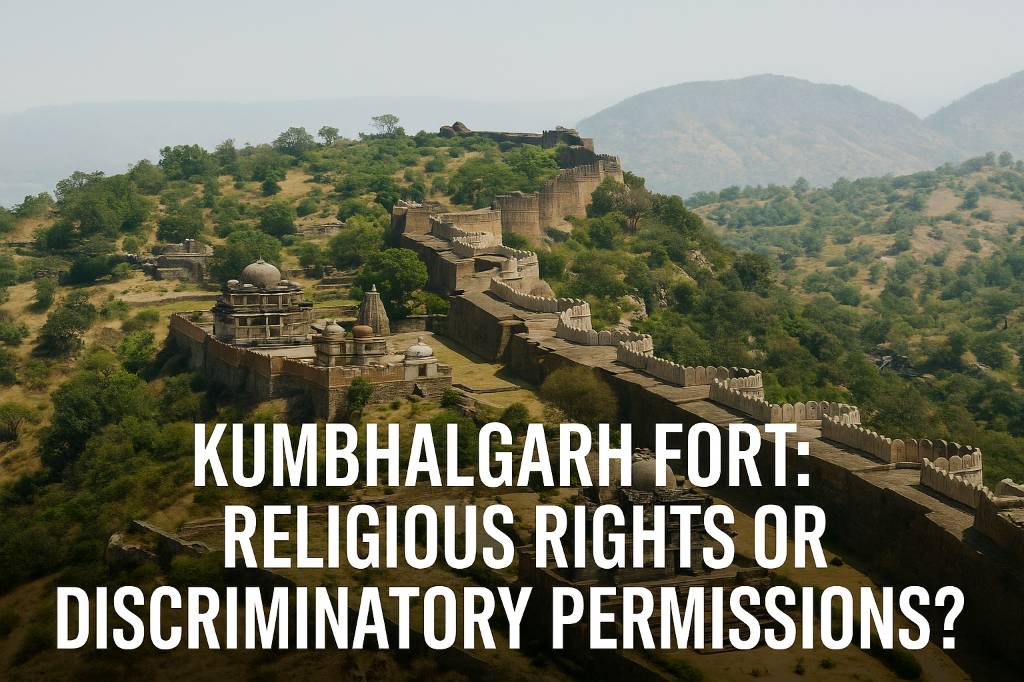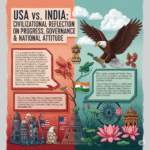
Kumbhalgarh (Rajasthan), July 4: A major controversy has erupted in Rajasthan after Hindu organizations raised strong objections to the government allowing a Muharram procession inside the ASI protected Kumbhalgarh Fort, while simultaneously denying permissions for celebrating Maharana Pratap Jayanti and Hanuman Jayanti in the same location. This decision has triggered a political and communal outcry, reigniting the debate on religious bias and cultural heritage rights in India.
The Kumbhalgarh Fort, located in the Rajsamand district of Rajasthan, is a UNESCO recognized site and a symbol of Rajasthan’s Rajput valor, closely associated with the legendary warrior Maharana Pratap. The fort is under the protection of the Archaeological Survey of India (ASI), and public events are generally regulated to ensure its preservation. However, the recent state sanctioned permission for a Tajiya (Muharram) procession inside the heritage premises has sparked intense protests from Hindu groups, who allege a clear case of religious discrimination.
Hindu Groups Question State Government’s Secular Stance
Prominent Hindu organizations in Rajasthan, including the Vishwa Hindu Parishad (VHP) and Hindu Jagran Manch, have condemned the Bhajan lal BJP led government for what they call a “blatantly discriminatory move.” Protestors gathered outside Kumbhalgarh Fort on Wednesday, waving saffron flags and chanting slogans demanding equal treatment for Hindu festivals like Hanuman Jayanti and Maharana Pratap Jayanti.
“Why is the state government allowing Muharram inside a fort built by a Hindu warrior, but not permitting us to celebrate Maharana Pratap Jayanti or Hanuman Jayanti there? This is an attack on our religious rights and heritage,” said Ramesh Bhardwaj, a VHP leader from Udaipur.
The protest in Kumbhalgarh has drawn support from various parts of the state, with many accusing the state authorities of appeasement politics. Some social media users have gone so far as to call it an “injustice against Hindus,” with the hashtag #JusticeForHinduFestivals trending on X (formerly Twitter).
ASI’s Role Under Scrutiny
The Archaeological Survey of India (ASI) has also come under criticism for allegedly allowing selective religious events. As per ASI rules, no religious or political activities are allowed in protected monuments unless explicitly permitted. Critics argue that if Muharram processions can be allowed, the same courtesy should be extended to festivals like Maharana Pratap Jayanti, which hold historic and cultural relevance to the site.
“Maharana Pratap was born here. Celebrating his legacy at Kumbhalgarh is not just religious it’s cultural and historical. How can that be banned while other religious events are approved?” questioned Dr. Sunil Joshi, a Jaipur-based historian.
Political Reactions and Accusations of Appeasement
The issue has quickly snowballed into a political flashpoint. The BJP, now in power in Rajasthan, has distanced itself from the permissions granted during the previous Congress regime. BJP leaders have assured that “no religious group will be discriminated against” under their governance.
“Under our government, heritage and culture will be respected equally. No group will be favored over another. We are reviewing the permissions granted by the previous administration,”.
Meanwhile, Congress leaders have criticized the BJP for “communalizing” the issue and attempting to divert attention from real governance challenges. “This is not about religion; it’s about maintaining secular integrity and preserving heritage sites,” stated former minister Govind Singh Dotasra.
Communal Harmony vs Selective Permission?
At the heart of the debate lies a broader question: should religious processions be allowed at historical monuments like Kumbhalgarh Fort, irrespective of faith? Or should the ASI enforce a blanket ban on all such events to maintain neutrality?
Supporters of the Muharram procession argue that Muslims have been commemorating Tajiya in the region for generations, and it is a peaceful event that does not damage the monument. However, Hindu groups claim that the state’s selective enforcement of rules is creating religious imbalance and resentment.
The denial of Hanuman Jayanti celebrations which usually involve only devotional songs and symbolic offerings has especially hurt sentiments. Devotees argue that these are non-intrusive spiritual events and should be allowed under regulated conditions.
Cultural Importance of Kumbhalgarh Fort
Built in the 15th century by Rana Kumbha, the Kumbhalgarh Fort is not just a historical structure; it is the birthplace of Maharana Pratap, one of India’s most revered warriors. Spread across the Aravalli hills, the fort’s massive 38 km wall is considered the second longest in the world after the Great Wall of China.
For many Rajputs and Hindus, the fort is sacred ground, symbolizing resistance against Mughal imperialism. “Denying us the right to honor our ancestors here, while allowing others to hold religious events, is cultural erasure,” said Shakti Singh Rathore, a Rajput youth leader.
Security Tightened as Tensions Rise
In response to growing protests, Rajasthan Police have increased security at the fort premises. Authorities have appealed for peace and issued a warning against inciting communal tensions.“We are monitoring the situation and speaking to community leaders from both sides. No one will be allowed to disrupt law and order,”.
Way Forward: Equal Treatment or Heritage First?
Experts suggest that the government must come up with a clear, consistent policy on religious events at heritage sites. “The ASI must either allow all communities under strict guidelines or disallow all religious gatherings completely,” said heritage conservationist Ananya Sinha.
As of now, the Tajiya procession has been concluded peacefully, but the questions raised by Hindu organizations remain unanswered. The state must address the growing perception of bias, or risk further erosion of trust among communities.
Conclusion
The Rajasthan Muharram vs Maharana Pratap Jayanti controversy is not just a case of permissions it reflects deeper concerns about religious equality, cultural identity, and governance consistency. As protests continue and political temperatures rise, the issue demands a balanced, transparent policy from the government and ASI alike.
Whether it’s Hanuman Jayanti, Maharana Pratap Jayanti, or Muharram, all communities deserve equal respect and rights especially when it comes to celebrating their legacy at sites of historical and cultural importance.
Stay Connected with The News Drill for more updates
📧 Contact us: contact@thenewsdrill.com
📢 Submit tips or stories: editor@thenewsdrill.com









